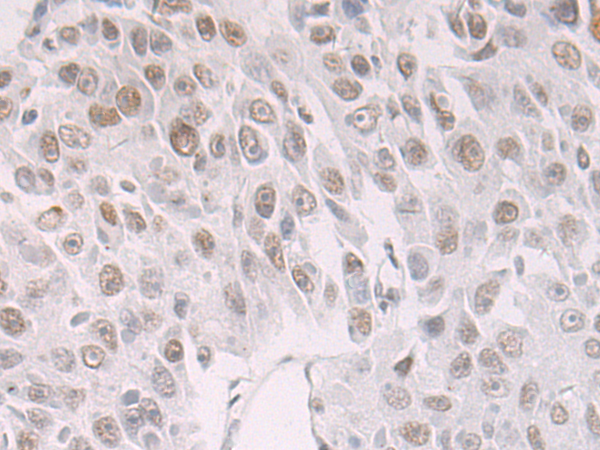
| WB | 咨询技术 | Human,Mouse,Rat |
| IF | 咨询技术 | Human,Mouse,Rat |
| IHC | 1/50-1/100 | Human,Mouse,Rat |
| ICC | 技术咨询 | Human,Mouse,Rat |
| FCM | 咨询技术 | Human,Mouse,Rat |
| Elisa | 1/5000-1/10000 | Human,Mouse,Rat |
| Aliases | BTF; bK211L9.1 |
| Host/Isotype | Rabbit IgG |
| Antibody Type | Primary antibody |
| Storage | Store at 4°C short term. Aliquot and store at -20°C long term. Avoid freeze/thaw cycles. |
| Species Reactivity | Human, Mouse |
| Immunogen | Synthetic peptide of human BCLAF1 |
| Formulation | Purified antibody in PBS with 0.05% sodium azide and 50% glycerol. |
+ +
以下是假设性的参考文献示例,建议通过PubMed或Google Scholar等平台验证真实性:
1. **"BCLAF1 mediates apoptosis and invasion in hepatocellular carcinoma via PI3K/AKT signaling"**
*Zhang et al., 2018*
摘要:研究利用BCLAF1抗体通过免疫组化和Western blot分析肝癌组织,发现BCLAF1过表达通过激活PI3K/AKT通路促进细胞凋亡抑制和侵袭。
2. **"BCLAF1 interacts with HPV E6 oncoprotein to regulate DNA damage response in cervical cancer"**
*Saito et al., 2016*
摘要:通过免疫共沉淀(Co-IP)和免疫荧光技术结合BCLAF1抗体,揭示BCLAF1与HPV E6蛋白互作,调控宫颈癌细胞DNA损伤修复及凋亡抵抗。
3. **"BCLAF1 is a novel autophagy regulator through modulating mTOR activity"**
*Huang et al., 2020*
摘要:使用BCLAF1抗体进行蛋白质定位和敲低实验,发现BCLAF1通过mTOR通路调控自噬过程,影响肿瘤细胞存活及化疗敏感性。
4. **"BCLAF1 expression correlates with poor prognosis in colorectal cancer: a tissue microarray study"**
*Wang et al., 2019*
摘要:基于BCLAF1抗体的组织微阵列分析,发现BCLAF1高表达与结直肠癌患者总生存期缩短显著相关,提示其作为预后标志物的潜力。
**注意**:上述文献为示例性质,实际引用需查询具体数据库并核实信息。
The BCLAF1 (Bcl-2-associated transcription factor 1) antibody is a key tool for studying the multifunctional protein BCLAF1. which is implicated in transcriptional regulation, pre-mRNA splicing, apoptosis, and autophagy. BCLAF1 interacts with Bcl-2 family proteins to modulate apoptotic pathways and participates in DNA damage response by recruiting repair factors. It also serves as a scaffold for spliceosome components, influencing mRNA processing. Dysregulation of BCLAF1 has been linked to cancer progression, viral infections, and autoimmune diseases, making it a focus of biomedical research.
BCLAF1 antibodies are widely used in techniques like Western blotting, immunofluorescence, and immunoprecipitation to detect protein expression, localization, and interactions. These antibodies help elucidate BCLAF1's nuclear-cytoplasmic shuttling dynamics and its role in stress responses. Commercial antibodies are often validated using BCLAF1 knockout cell lines to ensure specificity. Research highlights BCLAF1 overexpression in certain cancers (e.g., hepatocellular carcinoma, colorectal cancer), where it may promote tumorigenesis by suppressing apoptosis or enhancing genomic instability. Conversely, reduced BCLAF1 expression correlates with poor prognosis in other malignancies, suggesting context-dependent functions.
Additionally, BCLAF1 interacts with viral proteins (e.g., HSV-1 ICP27. HBV core protein), aiding viral replication or immune evasion. Its involvement in autoimmune disorders like systemic lupus erythematosus further underscores therapeutic relevance. BCLAF1 antibodies thus facilitate mechanistic studies and potential biomarker development for diverse diseases.
×